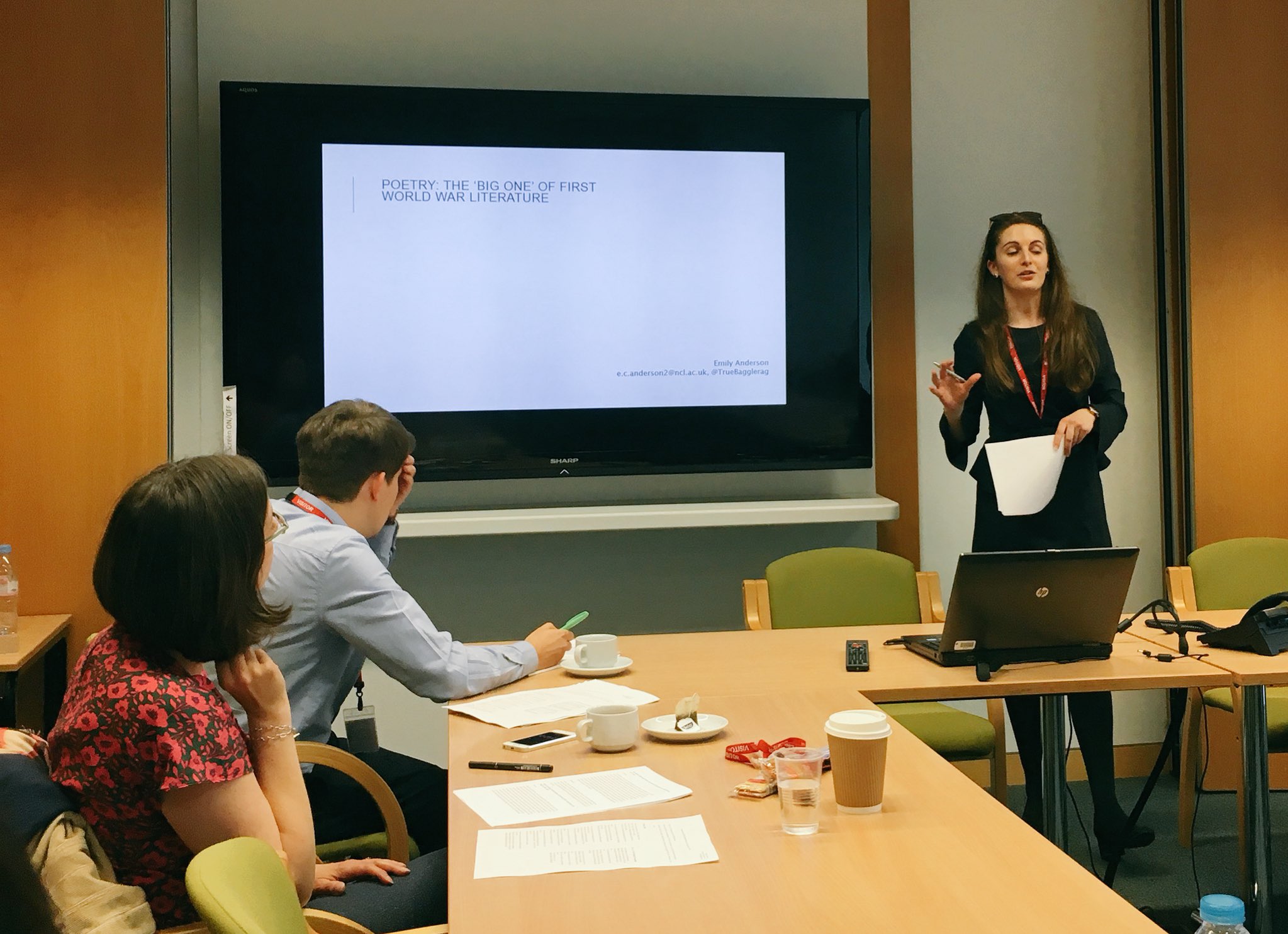Research interests
Literary humour, whimsy, aesthetic emotions, history of emotions, frivolity vs. seriousness, humour and representation, war representation, unfinished projects.
Monograph
Humour in British First World War Literature (Palgrave Macmillan, 2023) https://doi.org/10.1007/978-3-031-34051-2
This book explores how humorous depictions of the Great War worked to familiarise, domesticate, and tame the conflict. While well-known examples of First World War literature often emphasize enormous emotional disruption and the war’s extremes, other writers used humour to encourage a gentle, mild amusement, drawing on familiar, popular genres and forms used before 1914. In humorous portrayals of the war, tameness outdoes the unmanageable and the temperate exceeds the extraordinary. Humour in British First World War Literature is based on little-known primary material uncovered from detailed archival research, as well as works that, though written by celebrated authors, tend not to be placed in the canon of Great War literature. Each chapter examines key examples of literary texts, ranging from short stories and poetry to theatre and periodicals, in doing so investigating the complex representational, political, and social significance of the tame strand in humorous Great War literature.
Peer-Reviewed articles
Anderson, Emily, ‘An “unseemly joke”: Service-author Stories and Wyndham Lewis’s Blasting and Bombardiering (1937)’, Journal of Modern Literature, 42, 2 (2022), pp. 34-51 https://muse.jhu.edu/article/852071
—, ‘“There are many strange animals that will repay […] study”: Humour and Identity in Trench-Newspaper Natural Histories’, Literature & History, 31, 1 (2022) https://doi.org/10.1177%2F03061973221091877
—, ‘“There Was a Young Girl of the Somme, | Who Sat on a Number Five Bomb”: The Representation of Violence in First World War Trench Newspaper Nonsense Rhymes’, Literature & History, 27 (2018), 129–47 https://doi.org/10.1177/0306197318792388
—, ‘The 1916 Shakespeare Tercentenary in Scotland: Concepts of Nation-Ness and Cultural Prestige in Anniversary Tributes to the Playwright’, Shakespeare, 12 (2016), 185–210 https://doi.org/10.1080/17450918.2015.1042022
Selected Blog Posts and Work in Student Journals
Anderson, Emily, ‘Here Is the Secret. He Is – The Growler: A Northumberland Fusiliers Trench Newspaper’, World War I Centenary: Continuations and Beginnings, 2016 http://ww1centenary.oucs.ox.ac.uk/?p=3883>
—, ‘Re-Enchanting Nature’, Rev. of Landmarks, by Robert Macfarlane, The Oxonian Review, 29 (2015)
Conference Papers
‘Humour and the Written Representation of the Great War, 1914 – 1918’, Humour and the First World War, The Open University in London (June 2018)
‘Absurdity and Comic Absurdity in British First World War Literature’, Northeast Modern Language Association Annual Convention (NeMLA 2017), Baltimore (March 2017)
‘No Time But the Present: representations of tragi-comic time in First World War Poetry’, 9th Conference of the International Society for First World War Studies: War Time, the University of Oxford (November 2016)
‘“A great joke”? The Role of Humour in Robert Graves’ Representation of the First World War’, 13th International Robert Graves Society Conference, St John’s College, the University of Oxford (September 2016)
(Poster) ‘Humour and the Home Front: A Laughing Matter?’ Dissenting Voices and the Everyday in the First World War, the National Archives, London (September 2016)
‘Soldiers as Comic Heroes in British First World War Texts’, Laughing and Coping During World War One, the University of Bedfordshire, Luton (March 2016)
‘Soldiers as Comic Heroes in British First World War Texts’, Globalising and Localising the Great War Graduate Conference, the University of Oxford (March 2016)
‘Humour and Seriousness in Textual Representations of the First World War’, The First World War Postgraduate Symposium, Newcastle University (April 2015)
‘The 1916 Shakespeare Tercentenary Celebrations in England and Scotland: How British was Shakespeare during the Great War?’ LLC Colloquy 2014, the University of Edinburgh (May 2014)
I completed my AHRC-funded PhD at Newcastle University, UK, in 2019.
My PhD thesis is entitled ‘Humour and Representation in British Literature of the First World War 1914-1918’.
I addressed the role of humour in British First World War writing of the 1914-18 period. I argued that humour and the techniques used to create it performed important representational work, capturing and evoking a range of different experiences of the conflict. As part of this analysis, I established the ways in which types of humour developed in nineteenth- and early-twentieth century literature were adapted for depicting life during the war.
My primary PhD supervisors were Dr Anne Whitehead and Dr Martin Dubois, working alongside Professor Fran Brearton.
Research Collaboration
In 2019 I was a researcher for the AHRC-funded project ‘Piston, Pen & Press’: https://www.pistonpenandpress.org. The project seeks to uncover the literary activities of industrial workers in the nineteenth and early twentieth centuries. It asks what those working in industry wrote and read, and how they participated in literary culture. I visited archives in the North East of England, exploring the reading and writing activities of miners in Tyne and Wear, Durham, Northumberland, and West Yorkshire.
Whimsy
One of my research areas is whimsy in writing of the late nineteenth and early twentieth centuries. I am interested in which aesthetic emotions whimsy encourages, and why whimsy was especially prevalent in literature surrounding the turn of the century: what did whimsy offer readers and society? I am also interested in how understandings of whimsy and its relations to frivolity, pleasure, labour, and ethics have shaped debates about literary and cultural value. This includes interrogating associations between seriousness, difficulty, and worthwhile work.
Early Academic Work
Prior to my PhD, I completed an MSc in Comparative Literature at the University of Edinburgh and a BA (Hons) at the University of Cambridge. My MSc dissertation was entitled ‘The 1916 Shakespeare Tercentenary in England and Scotland: Concepts of “Nation-ness” in Anniversary Tributes to the Playwright’.
Research Groups and Service to the Profession
During my PhD, I co-organized events for the North East Forum for First World War Studies (NERFFS), and chaired the Postgraduate Student-Staff Committee in Newcastle’s School of English Literature, Language, and Linguistics (SELLL) in 2017/18. I have also been a student representative on the school’s Postgraduate Tutors Committee, and on the AHRC Northern Bridge Management Group.